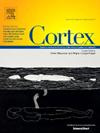Age-dependent semantic interference effect on propositional speech production
IF 3.3
2区 心理学
Q1 BEHAVIORAL SCIENCES
引用次数: 0
Abstract
Older adults can find verbal communication in noisy environments challenging, but the underlying cognitive phenomena and the specific mechanisms contributing to age-related decline remain unclear. Using a newly designed propositional speech production paradigm, we examined how semantic distractors of varying levels of relatedness affect propositional speech performance in healthy adults. In the paradigm, participants were assessed on their ability to formulate verbal responses while distracted by semantically related or unrelated words, simulating real-world scenarios with meaningful auditory distractions (e.g., sounds from radio programs). We also examined the cognitive processes associated with task performance. We recruited 30 younger participants (mean age: 22.23 years) and 27 older participants (mean age: 75.31 years) matched for sex, handedness, and intelligence. All participants were screened using the Montreal Cognitive Assessment (MoCA) and neuropsychological assessments. Older adults performed better than younger adults on a semantic memory task, but performed poorer on tasks assessing executive functions, including interference control, verbal response initiation and suppression, and semantic verbal fluency. In the novel propositional speech production task, older adults exhibited a pronounced semantic interference effect (F1.58, 83.67 = 4.67, p = .018, ηp2 = .08; with MoCA as a covariate), particularly for concrete distractors, resulting in longer response latencies compared to associative and unrelated distractors (Bonferroni-corrected P-values <.01). Exploratory correlation analyses revealed that longer response latencies in the propositional speech production task were associated with a poorer performance on neuropsychological tests tapping verbal response suppression (false discovery rate-corrected p < .05). Our findings suggest that verbal communication difficulties in the context of environmental distractions experienced by older adults could be due to the semantic interference effect. Cognitive interventions aimed at enhancing inhibitory control could be beneficial to older adults in maintaining their social engagement in the later life.
年龄依赖性语义干扰对命题语音产生的影响
老年人在嘈杂的环境中发现语言交流具有挑战性,但潜在的认知现象和导致年龄相关衰退的具体机制尚不清楚。采用新设计的命题语音生成范式,研究了不同关联度的语义干扰因素对健康成人命题语音表现的影响。在这个范式中,研究人员评估了参与者在被语义相关或不相关的单词分散注意力的情况下,通过有意义的听觉干扰(例如,广播节目的声音)模拟现实场景,制定口头反应的能力。我们还研究了与任务表现相关的认知过程。我们招募了30名年龄较小的参与者(平均年龄:22.23岁)和27名年龄较大的参与者(平均年龄:75.31岁),他们的性别、利手性和智力都相匹配。所有参与者都使用蒙特利尔认知评估(MoCA)和神经心理学评估进行筛选。老年人在语义记忆任务上的表现比年轻人好,但在执行功能评估任务上的表现较差,包括干扰控制、言语反应启动和抑制以及语义语言流畅性。在新的命题语音产生任务中,老年人表现出明显的语义干扰效应(F1.58, 83.67 = 4.67, p = 0.018, ηp2 = 0.08;以MoCA为协变量),特别是对于具体的干扰物,与联想和不相关的干扰物相比,导致更长的反应潜伏期(Bonferroni-corrected p值<;.01)。探索性相关分析显示,命题语音生成任务中较长的反应潜伏期与利用言语反应抑制的神经心理测试的较差表现相关(错误发现率校正p <;. 05)。我们的研究结果表明,老年人在环境干扰下的语言交流困难可能是由于语义干扰效应。旨在增强抑制控制的认知干预可能有利于老年人在晚年保持其社会参与。
本文章由计算机程序翻译,如有差异,请以英文原文为准。
求助全文
约1分钟内获得全文
求助全文
来源期刊

Cortex
医学-行为科学
CiteScore
7.00
自引率
5.60%
发文量
250
审稿时长
74 days
期刊介绍:
CORTEX is an international journal devoted to the study of cognition and of the relationship between the nervous system and mental processes, particularly as these are reflected in the behaviour of patients with acquired brain lesions, normal volunteers, children with typical and atypical development, and in the activation of brain regions and systems as recorded by functional neuroimaging techniques. It was founded in 1964 by Ennio De Renzi.
 求助内容:
求助内容: 应助结果提醒方式:
应助结果提醒方式:


